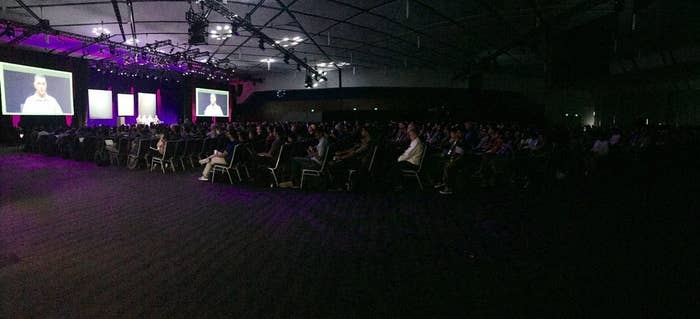
From early morning until evening on Monday, Facebook packed a convention center in San Jose with 1,800 engineers and similarly geeky folks for a conference looking at what lies underneath some of the world's most popular tech products. The attendees — drawn from companies such as Twitter, Pinterest, Uber, and Box — were there to share projects and compare notes on processes, and also to listen to Facebook discuss the latest technology it will make available to the industry at no cost.
It's counterintuitive, but Facebook — a company that makes its money from, and invests millions of dollars into building, new tech products — offers a good chunk of its technology to the public to download for free. Critical parts of its infrastructure, from its processing algorithms to the way it sets up its servers, can be obtained by anyone, even its competitors, easily through the web. This effort isn't unique to Facebook — these efforts fall into the broad category of "open source" — but still: A major, for-profit company organizing a daylong conference around giving technology away for free to anyone who wants it is notable. And as it turns out, it's because, at its heart, it's Facebook's network, not its technology, that matters.
"We don't sell software, so our entire business model is orthogonal to the actual tech stack that we built," James Pearce, Facebook's head of open source, told BuzzFeed News. "I'm not going to put this to the test, but in theory I could open source all of the Facebook technology and Sheryl [Sandberg] wouldn't know. It wouldn't affect our revenue." In other words: Facebook is unique — and uniquely successful, with well over a billion users — not necessarily because of its product, but because of the sheer number of people using it.
If your Facebook friends stopped using Facebook, you probably would stop using it. But as long as they do use it, you will too. This is why even your friends who say they hate Facebook still use Facebook. This is why Facebook was able to build a wildly successful messaging app from scratch. The platform has become a utility, the de facto way to connect, and many people would rather not do without it. So, if another service uploads photos as fast as Facebook does, it's no challenge. That's not what the company is competing on.
The open-sourcing project allowed Facebook to make available its "Fresco" tool kit, which makes displaying photos on Android more efficient. The company also open-sourced a code library called "React," which is aimed at helping developers code more quickly, and makes it easier to build apps for multiple operating systems.
Facebook, of course, isn't giving away its technology just to be nice. Open sourcing is attractive to would-be employees; new workers often come in already knowing Facebook's coding language, precisely because Facebook itself put it out there. And, Pearce said, open sourcing also means Facebook employees will write better software for themselves knowing it's going to be seen by other people.
The battle between companies like Facebook and Twitter and Pinterest and others is often portrayed as a ruthless, dog-eat-dog death match. And in many ways it is. But for a day in San Jose, the critical employees of these companies mingled about collegially, seeking to share and learn instead of grab and hide.
"Seeing our software at any given point is not necessarily an instant recipe for people to stand up and compete with us," Pearce said. "From my point of view that's a wonderful privilege because that means we can be really open about what we do."
